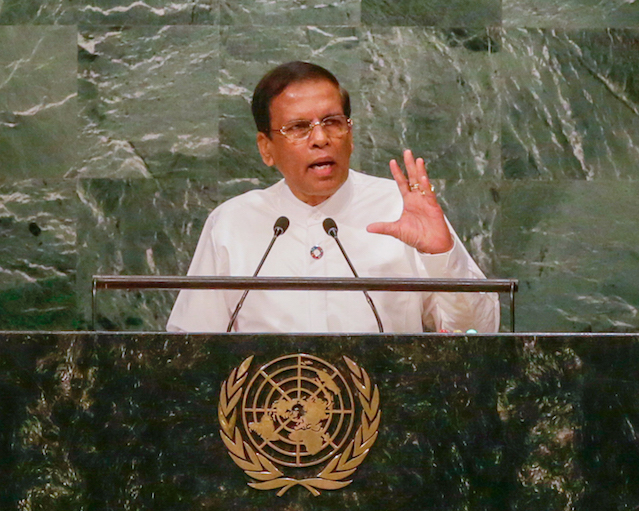1/3 Sinhala Version
2/3 English Version
3/3
Sri Lanka is a Buddhist country, where Theravada Buddhism
is practiced. There are solutions in Buddhist teachings to most of the
problems faced by the people in this world. Similarly, those who follow
other religions like Hinduism, Islam and Christianity too can find
answers to these problems by these great religious philosophies.
*Full text of the transcription of the speech delivered by President
Maithripala Sirisena at the 71st Session of the United Nations General
Assembly – 22. 09. 2016
I am extremely happy to take part in this 71st Session of the United
Nations General Assembly. I wish to bring to the notice of Your
Excellencies the current situation in my country. I have been in power
for the last 15 months. There are many problems in my country.
We have, in recent months, taken many important steps for
socio-economic transformation. Before I came to power, people in my
country were living in fear and I ended that period and made the people
free of fear, established rule of law and restored democratic rights.
My intention is to make peole of Sri Lanka one of the happiest among
the world communities by establishing a knowledge-based society. I am
determined to alleviate poverty in my country. For that purpose I have
declared 2017 as the Year of Alleviation of Poverty.
In order to improve the living standards of our people, we have to
provide better facilities for economic development. I have given the
topmost priority to take my country forward by working in cooperation
with the United Nations and its agencies and other institutions. We have
to make necessary changes to achieve sustainable development. The
priority areas of the government include establishment of a
knowledge-based economy with new initiatives and creation of a green
economy.
As an Island-Nation, Sri Lanka wishes to make maximum utility of sea
resources, fisheries and marine resources. All these require new
technology and we seek the support of the international community for
these purposes. Sri Lanka is a country with free education and free
health services and the country has all the basic infrastructure
requirements for speedy development.
The world today is full of hate, violence and fear. We must free our
people from such hatred and fear and establish a society with moral
values. The government is totally committed to reconciliation process to
establish lasting peace. That would definitely prevent occurance of
another war in our country. Terrorism lasting three decades has ended
and now we have undertaken the process of reconciliation among the
different communities. We require the support of the international
community to successfully face these challenges.
Sri Lanka is a Buddhist country, where Theravada Buddhism is
practiced. There are solutions in Buddhist teachings to most of the
problems faced by the people in this world. Similarly, those who follow
other religions like Hinduism, Islam and Christianity too can find
answers to these problems by these great religious philosophies.
I am totally committed to eradicate drugs. As the President of Brazil
said this morning, illicit drugs have become the most serious challenge
faced by our societies today. Unless we take early steps to stop the
menace of drugs we will be faced with a catastrophe of unprecedented
magnitude. The harm caused to the people, especially the young students
by illicit drugs is very serious. We have to eradicate drugs and ensure
that illicit drugs would not reach our countries.
We have taken effective steps to strengthen democracy, rule of law
and good governance in our country. We want to create a better country
for our people. To achieve these, I need the assistance of the
international community.
Different countries have their own unique authentic thinking. We too
have such authentic thinkings and visions. I want to create a country,
in which our people can live as better humans and I need your support
for this endeavour.
I wish to take this opportunity to express appreciation about the
services rendered by the outgoing UN Secretary General Ban Ki-moon. He
provided and excellent service to the entire world.
I would like to metion that my desire is to arm the new generation with knowledge and modern technology. I will do my duties and fulfill my responsibilities towards my people and I seek your assistance and blessings of you all for this task.
I would like to metion that my desire is to arm the new generation with knowledge and modern technology. I will do my duties and fulfill my responsibilities towards my people and I seek your assistance and blessings of you all for this task.
May the Triple Gem bless you!
*Full text of the transcription of the speech delivered by President Maithripala Sirisena at the 71st Session of the United Nations General Assembly – 22. 09. 2016 (Colombo Telegraph)
Home Sri Lanka Think Tank-UK (Main Link)


